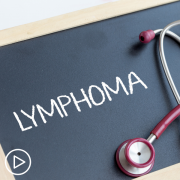Advice for Speaking Up About Your DLBCL Care
Advice for Speaking Up About Your DLBCL Care from Patient Empowerment Network on Vimeo.
Why should you speak up about your DLBCL care? Dr. Jason Westin explains why being an active member of your healthcare team is vital and provides helpful resources.
Dr. Jason Westin is the Director of Lymphoma Clinical Research in the Department of Lymphoma/Myeloma in the Division of Cancer Medicine at The University of Texas MD Anderson Cancer Center. Learn more about Dr. Westin, here.
See More From The Pro-Active DLBCL Patient Toolkit
Related Programs:

|

|

|
Transcript:
Katherine:
Right. That leads me to my next question. What advice do you have for patients who don’t feel comfortable speaking up but they have questions about their treatment plan?
Dr. Westin:
Yeah. I think written questions sometimes are easier than trying to remember all of your questions. It always is a bit problematic when I go into a visit and a patient has six pages of paper written down for questions. We unfortunately don’t have unlimited time to get through all of those. But trying to condense into – prioritizing. Which of the questions are the ones that I feel like I must get into and which are ones that I can submit to have answered after the fact.
Perhaps the nurse could send me a note through the electronic medical record to answer questions 10-15 on my list. So, I think you can overwhelm a visit if you show up with a list of questions that are even 30-second answers might take an hour to answer all of them. That’s sometimes counterproductive, in my opinion, to have that level of detail on a single visit. But it’s fair to say, “Can I contact the healthcare team to get these answered electronically through the EMR,” or, “Can we table this and go into the questions that we didn’t get to at our next visit?” I think both of those are appropriate.
I think people that are not comfortable to push back on the physician, or the PA, or the nurse, doing things in writing sometimes feels a little bit less confrontational for people. So, I think that’s important to have as a backup option.
Katherine:
And I imagine caregivers can be helpful in this regard as well.
Dr. Westin:
Correct. Yeah. I think caregivers are a key part of that. And sometimes we go into a room and the patient says, “Nope. Don’t have any questions.”
And then, the caregiver has got a whole list of them. That’s very appropriate. Caregivers have that responsibility and that role to play sometimes, to be the key questioner.
Katherine:
Yeah. Are there resources to help patients and their loved ones to weigh the risks and benefits of different treatment options?
Dr. Westin:
There are. There’s lots of resources online and I would make sure that you go to a trusted site. Sometimes things sound too good to be true because they’re not true. But things like the lymphoma research foundation or the LLS, the Lymphoma & Leukemia Society, are great sources for information. And sometimes they may link you to other sites. You could also ask your healthcare provider does their institution have anything specific about this disease. Sometimes your healthcare provider might tell you, “Here’s the right article if you want to go read the source, the clinical trial, that was published to show why this treatment’s good.” They may show you that paper.
But online, careful how deep into the weeds you go because sometimes you can find things that aren’t correct. Trust good, trusted sources.
Katherine:
Do you think patients should consider a second opinion consult with a specialist?
Dr. Westin:
It sometimes is appropriate. Other times, there’s not a lot of time. If treatment’s needed right away, you don’t want to get sicker because you’re waiting for seeing somebody two states over and it takes two weeks to get there. Sometimes you want to start treatment and get the second opinion after you’ve got the fire put out. But the second opinion usually gives more peace of mind than actually changing treatments. But if you’ve got that thought of, “I’m not so sure this is what I’d like to do,” or, “I’d like to get more information,” a second opinion may be very appropriate.









